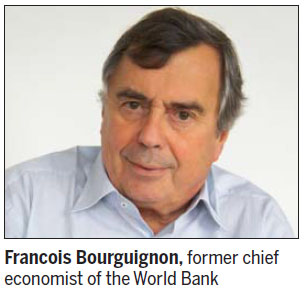Bank will deal in more than just small change
Updated: 2015-04-03 07:27
By Zhang Chunyan and Ning Hui(China Daily Europe)
|
|||||||||||
New institution seen as complementing existing institutions rather than competing with them
The proposed Asian Infrastructure Investment Bank will greatly complement current economic institutions, industry insiders say.
Voting arrangements in some international financial institutions have become obsolete, they say, which makes efforts by China to create the new bank all the more important.
Francois Bourguignon, former chief economist of the World Bank, says decision-making processes in institutions such as the World Bank and the Asian Development Bank do not accord with the way China, the world's second-largest economy, thinks things should be done.
In the World Bank and the International Monetary Fund, which are both Washington-led, China has gradually gained greater voting power, albeit slowly.
In 2010 it was decided that in the World Bank, China's relative voting weight would increase to 4.42 percent, compared with 15.85 percent for the US and 6.84 percent for Japan.
In the IMF the figure for China is 3.81 percent and for the US 16.75 percent. In effect that means that in both institutions the US has a huge advantage in decision-making.

Danny Quah, director of Southeast Asia Centre at the London School of Economics and Political Science, says: "The IMF has already agreed that China will get a large stake, and this has been on the cards for five years now. But it doesn't look like the US is going to sign off on it."
In the Asian Development Bank Japan holds the largest proportion of shares at 15.67 percent, and the US holds 15.56 percent. The third-largest shareholder is the European Union with 14.4 percent. China is fourth with 6.47 percent.
Eswar Prasad, former head of the IMF's China division, says: "China seeks to show that it can provide constructive global leadership that enhances rather than detracts from the existing international economic order."
The case for a new bank in Asia has been bolstered with the argument that there are certain areas in which the World Bank, the IMF and the Asian Development Bank are deficient.
The funding gap in Asian infrastructure investment is widely recognized by such institutions. In fact, an often quoted figure - the $8 trillion gap in overall national infrastructure in Asia between 2010 to 2020 - was originally made public by the Asian Development Bank in 2009.
That bank's capital capacity, on the other hand, is far short of the $8 trillion it says it needs. In 2013, for example, the Asian Development Bank's operations totaled $21.02 billion.
"The problem is the funding gap," Quah says. "If we left it to the Asian Development Bank, it would be quite a while before we could get any action on infrastructure investment."
Bourguignon says: "What we observe, following the recent two to three decades, is that both the World Bank and the Asian Development Bank have been reluctant to lend money for investment in infrastructure. A couple of years ago, you find that the proportion for infrastructure was very low (in the World Bank).
"The reason for the restraint in investing and lending in infrastructure was to some extent due to the fact that the banks know there is a lot of corruption in infrastructure investment."
The World Bank tries to combat corruption by tough oversight, he says.
However, in many cases "when you look at middle-income countries, they can increasingly borrow from commercial banks, and because of that they are able to tell the World Bank or the Asian Development Bank that they don't want the tight monitoring, otherwise they will borrow from the commercial banks".
"Because of that, monitoring has been weakened, and consequently the boards of the two institutions have been advising against continuously investing in infrastructure."
Prasad says the Asian Infrastructure Investment Bank's stated objective, financing infrastructure projects in Asia, means it will complement rather than compete with the work of other multilateral institutions.
"The Asian Infrastructure Investment Bank is creating a governance structure that removes many of the problems present in existing multilateral institutions."
(China Daily European Weekly 04/03/2015 page7)
Today's Top News
54 dead after Russian trawler sinks in ocean
Death toll rises to 147 in Kenya university attack
Dozens killed in Kenyan university attack
Video of final seconds aboard Germanwings plane discovered
British Prince Harry reports for duty in Australia next week
Chinese World War II veterans to receive medals from Russia
Lufthansa insurers set aside $300 mln over crash
Sarkozy makes political comeback
Hot Topics
Lunar probe , China growth forecasts, Emission rules get tougher, China seen through 'colored lens', International board,
Editor's Picks

|

|

|

|

|

|






